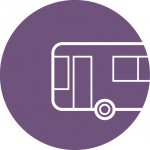Areas of Learning
There are five key areas of learning at Transition2, the identification of which helps to focus our young people and families/carers on possibilities for future life outcomes.
Learners and their circle of support work with our experienced teaching and learning team to co-produce realistic medium to long term goals which are divided into targets within specified learning priority areas, bespoke to their EHCPs.
 Community Skills
Community Skills
Being a part of our local community is really important to us here at T2 so we encourage our learners to go out and experience all the exciting things Derby and Derbyshire have to offer. Whether you want to travel independently on public transport, become more confident at the shops or learn to look after yourself in and around the local community, we can support you to practise and develop your skills.
Opportunities available in this area of learning include Independent Travel Training and Communicating for Shopping and Leisure.
 Learning for living
Learning for living
Wrap around support for employment and active citizenship is important, such as preparing a packed lunch or selecting appropriate clothing for the weather. Here at T2 we offer lots of opportunities to gain confidence in wrap-around support skills, including important lessons about how to keep yourself healthy and safe, by taking regular exercise, eating a balanced diet and attending your annual health check.
 Functional Skills
Functional Skills
Here at T2 we embed functional skills such as literacy, numeracy and ICT across all areas of learning. In our extensive experience working with this age group of learning disabled or Autistic young adults, classroom based lessons in English and Maths can be extremely triggering for many of our learners, reminding them of previous experiences in which they have felt overwhelmed, incapacitated or negatively self-reflective due to their perceived or measured academic skill level. Working with letters and numbers is meaningfully embedded in practical, realistic situations of daily living at T2, such as using the bus, contacting friends or colleagues, following a recipe, making a shopping list or setting alarms on your phone for important activities. Learners are more enthusiastic and relaxed with literacy and numeracy when they can understand the tangible use of these skills for their adult lives, such as social communication , employment or being more independent.
Whether you want to be more confident with your debit card, learn how to understand your wage slip or spend your money responsibly within a budget, we can support you to gain the skills to become more independent and also to understand the responsibilities this brings. Like all aspects of adulthood, as Spiderman said “with great power comes great responsibility!“.
 Self-management
Self-management
We believe it is important to get to know yourself really well at this stage of your life so that you can understand more about the future you would like to have and how to get the skills and support you need to make it happen.
Perhaps you find busy or noisy places challenging or maybe you are trying to take more responsibility for your health … life as a young adult is all about learning more ways to help yourself, understand the world around you and become more independent.
 I want to work
I want to work
Learners are supported to understand their own assets, skills and preferences prior to exploring work placements, which includes helping them to understand the crucial difference between hobbies or interests and realistic skills for the workplace. They are also guided to gain a deeper understanding of job sectors, roles and levels of responsibility to meaningfully match their experience to opportunities.
Many of our learners gain their first employment or voluntary roles based more on their qualities than their qualifications, often entering a starting position with a low, or no, skill requirement. In this context, it is crucial for learners to not only understand what they are good at skill wise but also to appreciate the personal qualities required for a specific profession or workplace, such as good time-keeping, honesty, perseverance, trustworthiness, teamwork or sense of humour. These qualities are a great foundation upon which to learn, practise and develop skills within entry workplace roles that can lead to the next level of responsibility and meaningful career progression.
Job-carving, systematic instruction and job-coaching are professional skills that allow our experienced team to support learners into the workplace. In 2023/24, we are working with the NDTi on the Internships Work programme to pilot a Supported Employment Agency through which we can offer roll-on, roll-off follow on job coaching to maximise the sustainability of employment outcomes and ensure career development for lifelong progress.

‘One size fits one’
At Transition2 we take a person-centred, individual approach to supporting our learners on their journey to sustainable outcomes in adulthood. All our pathways are co-produced with the young person and their circle of support in order to meet the individual’s long-term learning goals. This way of working embodies our ethos that ‘one size fits one’.